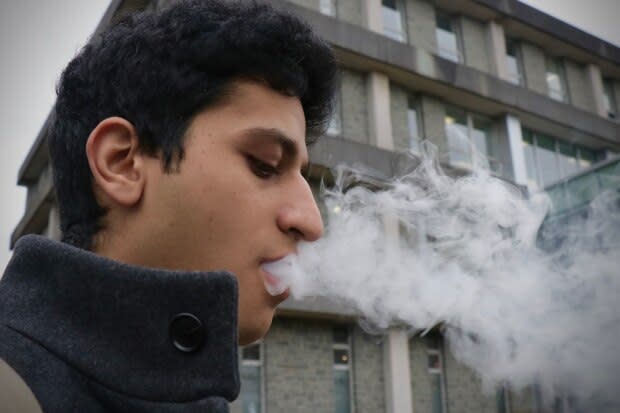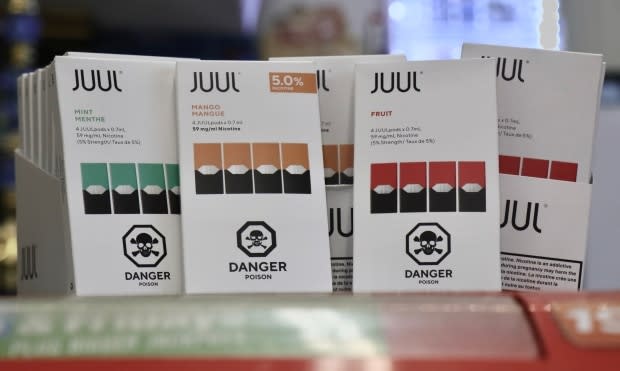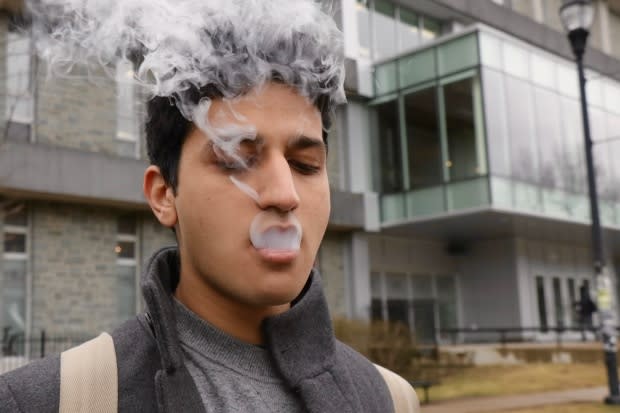Nova Scotia to become first province to ban sale of flavoured e-cigarettes and juices
Nova Scotia says it will become the first province to make it illegal to sell any kind of flavoured e-cigarettes and juices, announcing Thursday a ban that will come into force on April 1.
The province has worked hard to become a smoke-free culture and doesn't want to lose ground as the number of people who are vaping continues to grow, said Health Minister Randy Delorey.
"This is about reducing the rates," he said. "What we've seen in the last couple of years since e-cigarettes have become widely available in Canada and indeed throughout much of North America is a rapidly growing rate, in particular youth vaping."
The non-profit group Smoke Free Nova Scotia recently conducted a survey that showed 95 per cent of youth who vape in Nova Scotia said they prefer flavoured juices, and more than 48 per cent said they would quit if flavours were banned.

The only types of e-cigarettes and juice that will be available in Nova Scotia after the ban comes into effect are bland and tobacco.
"This is a good first step and I think we can anticipate a reduction in the number of youth vaping," said Delorey.
Other provinces have moved to regulate vaping, including restrictions on advertising and promotion. Last month, Prince Edward Island passed legislation that will allow it to ban certain flavours.

Health officials in Canada and the U.S. have serious concerns about vaping as the number of people showing up in hospital with vaping-related illnesses increases.
A CBC News investigation discovered many e-cigarette liquids contain harmful chemicals, including a suspected carcinogen banned in food in the U.S. Lab tests showed two chemicals in particular — pulegone, a suspected carcinogen, and benzaldehyde — could endanger human health if vaped at high levels.
The release from the Nova Scotia government said the "full flavour" ban is the first step in addressing youth vaping, and the province plans to roll out a public education campaign in the new year and introduce legislation in the upcoming session to further address vaping.
In May 2018, federal legislation was passed to formally legalize and heavily regulate vaping in Canada. The legislation included regulations banning flavours designed to mimic "confectionery," cannabis, soft drinks or energy drinks.

Ahmed Milleti, 22, started smoking when he began studying at Dalhousie University four years ago. When it became expensive, he turned to vaping because he felt it wasn't as bad for him.
Now he likes the flavour, and said he vapes more often when he's stressed, such as during exam season. Milleti expects he'll be able to quit when the ban starts, but he worries others addicted to nicotine won't.
"I think it's a bad idea because if you ban flavoured nicotine, like vape-juice, people go back to cigarettes," he said.
The ban is also getting blowback from vaping retailers who say they were not consulted.
Kyle Bitar, who runs Vapor Hub in Halifax, said the ban will be "catastrophic," and not just for people like himself who have businesses.
"They're not just harming me. They're harming the thousands of people we help every month," he said.

Interest groups including the Canadian Cancer Society, the Lung Association of Nova Scotia and Smoke Free Nova Scotia were on hand for the government's announcement Thursday.
They all agree putting in a "full flavour" ban is a good first step to curb youth vaping rates, but said far more work needs to be done.
"It's a decision that we're really pleased with. This is really kind of taking action that's concrete today, and then those supportive measures will hopefully come in place in the spring," said Kelly Cull, director of public policy with the Canadian Cancer Society in Atlantic Canada.
Cull still wants the province to raise the minimum age to buy vaping products to 21 from 19, and rules established so such products can only sold at adult-only venues. Banning online sales and capping nicotine levels in the products would also help, she said.

Both the Lung Association and Smoke Free Nova Scotia said increasing the taxes on e-cigarettes and other vaping products should also be considered.
"We need to prevent youth from finding a route towards tobacco smoking, so by implementing such a policy, we're effectively reducing youth vaping rates and thus the percentage of youth who are going to smoke in this province," said Mohammed Al-Hamdani, executive director of Smoke Free Nova Scotia.

Some are skeptical the ban will do anything to deter teens from vaping. Mike Habib said he only sells products to adults at his convenience store and the market has been growing. He said often young people don't even try to purchase from him.
"The product is available online. That's mainly where the industry is headed," he said. "When you order online, where is the supervision? [Young people] can get somebody's ID and put it in but there's nobody checking."
University student Jad Ghiz called the ban a "Band-Aid." He has never smoked cigarettes but when he was underage, he and his friends would always order products online.
He doubts the ban will discourage teens, though he hopes it will be motivation for him to finally kick the habit.
"That's one of my resolutions, to slow down at least. But maybe it'll help," he said.
MORE TOP STORIES


